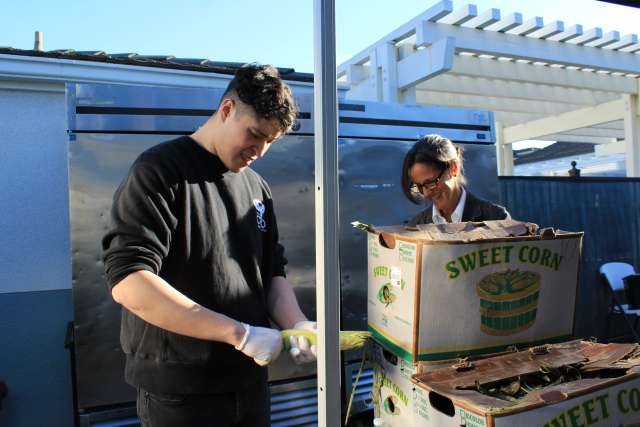
Image description: Dr. Wendy Slusser sorts fresh produce sourced from local markets alongside UCLA student Abrahan Hernandez on Jan. 16, 2025. The pop-up food distribution was organized by the Community Programs Office in collaboration with UCLA Semel Healthy Campus Initiative (HCI) Center, UCLA Residential Life and the non-profit organization Food Forward. (Photo by Jade Takahashi/Semel HCI Center; from UCLA Health article: https://www.uclahealth.org/news/article/impact-nutrition-every-stage-life)
By: Karen Hallisey
What and how we eat impacts the environment. At UCLA, several campus organizations, many led by students, plus a local group, are dedicated to doing something about this and improving food security for their fellow Bruins.
First, a little background to whet the appetite on how food and sustainability are intertwined. Food production and consumption have environmental impacts. Both our choices about which food to eat and which vendors to patronize have associated carbon emissions and waste footprints.
In terms of food choices, consider options that are plant-based, locally sourced and seasonal. As for food product vendors, look for ones with paper, metal or glass packaging that will be recycled or else can be reused. Avoid options with lots of plastic packaging. As for uneaten items discarded into the garbage? Left to the landfill, they lead to harmful methane emissions, so look into what options you have to compost your food scraps and waste. The economic and social part of the food sustainability equation concerns fair trade and labor practices for agriculture workers — as well as supporting local farmers — and ensuring all people have access to sufficient, safe, and nutritious food.
Here are some of the campus and local groups combatting food loss and helping.
Founded in 2018, this student-run organization aims to bridge the gap between food waste and food insecurity by recovering food from UCLA’s dining halls that would otherwise be thrown away, and redistributing it to campus and community members in need. Food recovery events occur multiple times a week each quarter, with diners asked to bring their own containers and utensils, further greening this UCLA food recovery effort.
Community Programs Office Food Closet
Supporting students by providing free food to anyone experiencing hunger and/or struggling to attain food due to financial hardships, they additionally host a harvest distribution — open to the entire UCLA community — to bring Bruins free produce gleaned from markets across Los Angeles.
Jane B Semel HCI Community Garden
Located atop UCLA’s Sunset Canyon Amphitheater is a space comprised of raised garden beds and an assortment of fruit trees. Part of the Semel Healthy Campus Initiative Center, the garden provides an on-campus space for the Bruin community to grow healthy food, learn about urban gardening practices, and enjoy free, fresh produce.
This professional network for students is dedicated to promoting a plant-centric food system that addresses the climate crisis and food security. The initiative is focused on education and awareness of the social justice, health benefits, and environmental sustainability aspects of sticking to fruits, vegetables, grains, nuts, seeds, and more and building a community of Bruins committed to a plant-centric future. They also host plant-based potlucks.
UCLA Basic Needs Center at Strathmore
The center supports members of the campus community with several programs to provide free of charge essentials, including food resources. This branch located at 555 Westwood Plaza, Room 106, runs a monthly mobile market in collaboration with nonprofit organization Student LunchBox to distribute free fruits, vegetables, canned goods, and other groceries to any UCLA student.
Run through UCLA Recreation, the kitchen is an educational, interactive space to meet the needs of Bruins in areas including nutrition education, food insecurity, and community engagement. Programs include plant-based cooking workshops, a Meatless Monday series of classes, and recipe resources, emphasizing healthy and affordable options that are delicious.
The neighborhood cooperative has an affordable and accessible CSA (Community Supported Agriculture) food program that supplies locally grown food to UCLA’s student body.
Cheers to a more sustainable meal at your table — with no scraps left behind!
